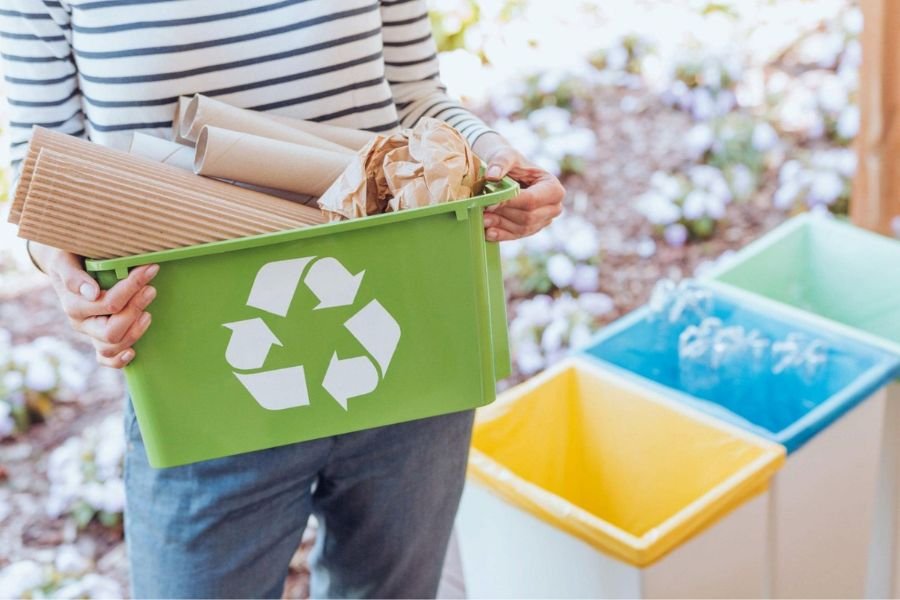Is Recycling the Ultimate Solution to Waste Problems?

Although recycling is an essential part of trash management, it might not be the best way to address our waste problems. Recycling saves supplies and lessens the need for landfills, yet it is insufficient to handle the daily increase in trash production. Prioritizing trash reduction, reuse, and implementing eco-friendly measures in addition to composting is necessary to accomplish environmentally friendly waste management. Using the right methods for disposal is essential to protecting the surroundings. For locals looking for effective garbage management solutions, Skip hire Failsworth offers a first-rate service for properly managing big waste loads. When combined, these initiatives can greatly lessen their negative effects on the natural world and advance sustainably.
Decrease in Landfill Garbage
The quantity of garbage that ends up in landfills is greatly decreased. When recyclable materials such as paper, glass, plastic, and metals are processed and repurposed, they significantly decrease the volume of waste that would otherwise contribute to overflowing landfills. This not only conserves natural resources and energy but also minimizes the environmental impact associated with waste disposal, including greenhouse gas emissions and soil and water pollution.
Communities can extend the lifespan of existing landfills and reduce the need for new landfill sites, fostering a more sustainable and environmentally responsible approach to waste management. Processing and reusing materials like metal, plastic, and paper can save storage and stop dangerous chemicals from leaking into water from the ground and soil. However, because waste sorting is inefficient, only a small portion of recyclable substances gets repurposed.
Preservation of Natural Resources
Recycling reduces the need to extract natural assets like minerals, petroleum coal, and plants by reusing products. This lessens the ecological impact of resource exploitation and contributes to maintaining natural environments. Recycling is a step in the right direction, but it cannot entirely substitute the need for raw materials, particularly in sectors which require excellent quality sources.
Lowering Emissions of Greenhouse Gases
By lowering the amount of power required to create fresh supplies, recycling lowers greenhouse gas emissions. Nevertheless this advantage, a large number of recyclable materials are burned, increasing carbon dioxide emissions.
Promotes a Circular Economy
Recycling is a key component of a circular economy, which seeks to prolong the use of assets. It promotes longevity by converting waste into novel items. The concept of the circular economy, however, also depends on decreased waste and reuse, two areas in which existing systems frequently fail.
Changes in Behavior and Public Awareness
Recycling encourages people and businesses to embrace more sustainable practices by raising their understanding of environmental challenges and trash management. It initiatives alone are unable to control the worldwide amount of garbage production, particularly in areas lacking sufficient infrastructure, even though this socioeconomic transformation is crucial.
Recycling Faces Issues with Contamination
Pollution is a significant barrier to recycling. When recyclables and non-recyclables are combined, entire samples may become worthless, increasing waste. Eliminating this obstacle requires improved sorting technology along with successful education.
Not Every Material Can Be Recycled
Recycling some materials can be challenging or impossible, such as toxic trash, composite substances, and some polymers. These materials frequently wind up in burning facilities or garbage dumps, indicating a need for repurposing as an all-encompassing option.
Expensive and Energy-Intensive Recycling Procedures
Recycling still uses a lot of assets, even though it uses less energy than creating fresh substances. The high expenses of collection, sorting, and processing can be a deterrent for organizations and authorities. As a result, it is most effective when combined with other strategies like waste reduction and reuse.
Global Differences in Infrastructure for Recycling
Globally, recycling capacities differ greatly. While developing countries might not have the physical structures necessary, industrialized nations frequently have sophisticated systems. This discrepancy highlights the necessity of international cooperation and leads to uneven handling of waste achievements.
Excessive Dependence on Consumer Responsibility
Recycling initiatives frequently put the onus of effective disposal of items on customers. Nevertheless, efficacy is hampered by a lack of awareness and misunderstanding regarding what can be recycled. Both governments and companies need to take the initiative to provide more readily available platforms and simpler regulations.
Ignores Excessive Consumption
Recycling is insufficient to address the underlying problem of a lot of consumption. Even the best recycling programs are unable to keep up with the extraordinary rates of waste generation in modern civilizations. Making substantial improvement requires lowering expenditure and creating items with greater longevity. Also read:
Understanding the Flow-Tech Dual Function Softener/Filter
Final Words
Recycling has indisputable advantages, including preservation of resources, pollution reduction, and environmental sustainability promotion. It does have some limits, though. Recycling is not the best way to deal with trash issues, as evidenced by issues like pollution, high expenses, and the incapacity to handle excessive consumption.




